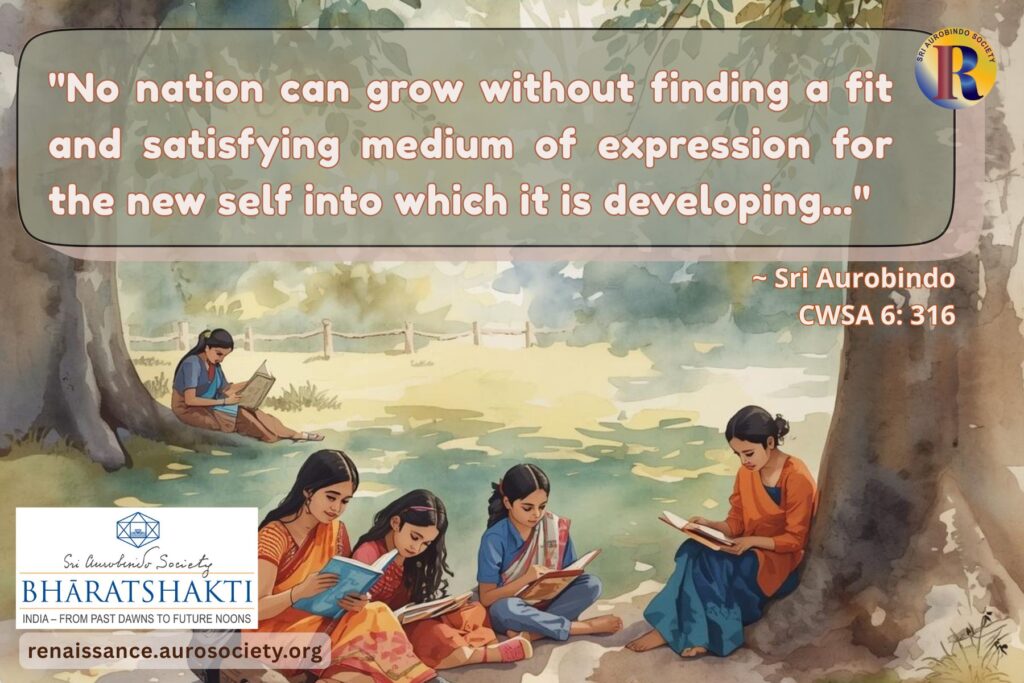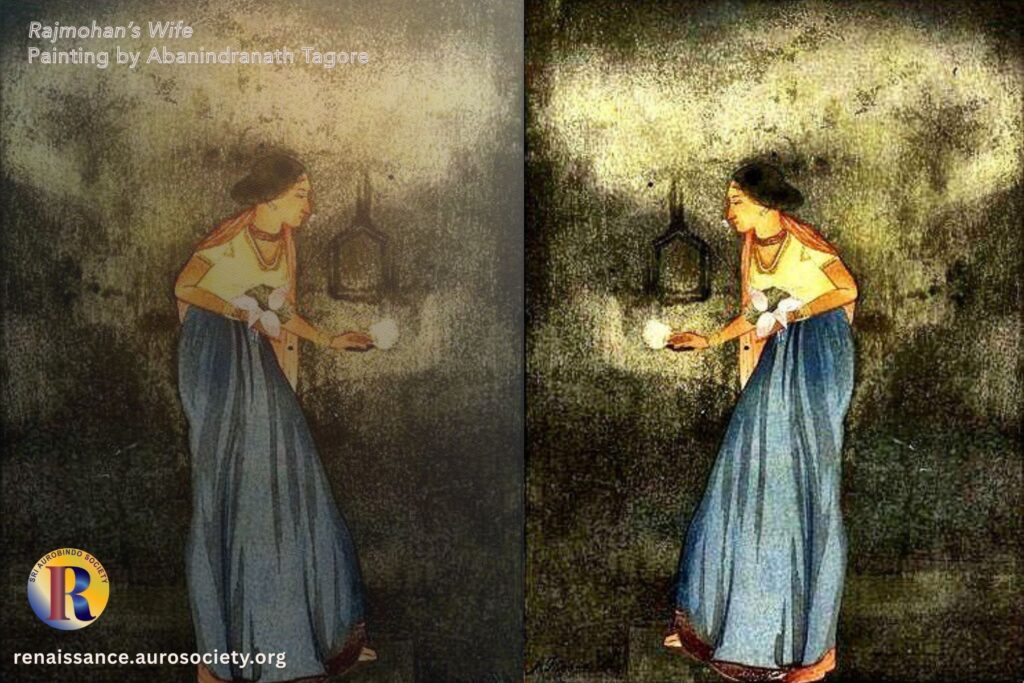Volume V, Issue 9
Author: Rabindranath Tagore
Editor’s Note: In our Book of the Month we feature some excerpts from an essay from Rabindranath Tagore’s book titled Sādhanā: The Realisation of Life. The book, as Tagore writes in the preface, presents in a connected form many of the ideas culled from his Bengali discourses that he often gave to his students in Bolpur in Bengal.
These excerpts are followed by the English translation of a beautiful poem by Tagore who penned it in Bangla. Titled Purnima, it speaks of the poet’s deep realisation of beauty on a full-moon night. The translation is done by Narendra Murty.
Sri Aurobindo once remarked that “Tagore thinks by vision, imagination, feeling or by intuition, not by the reason—at least that is true of his writings” (CWSA, Vol. 31, p. 17). In this regard, we recommend that after reading this essay readers also read Sri Aurobindo’s views on some of the points brought out by Tagore. We draw special attention to the letter dated 3 November 1936.
We have made a few minor formatting revisions for the purpose of this digital presentation. And have also added a few sub-headings for the ease of online reading.

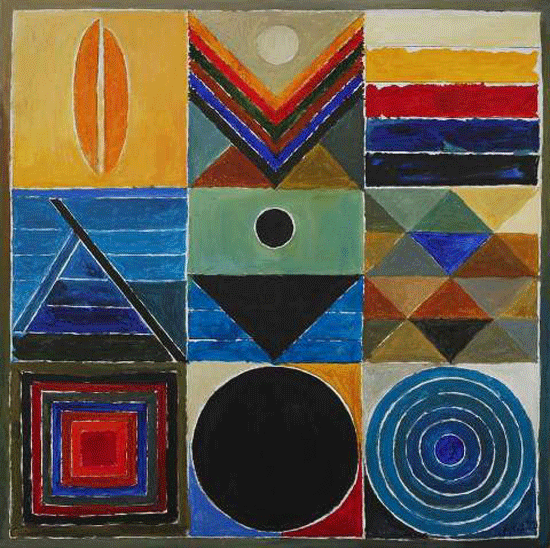
Things in which we do not take joy are either a burden upon our minds to be got rid of at any cost; or they are useful, and therefore in temporary and partial relation to us, becoming burdensome when their utility is lost; or they are like wandering vagabonds, loitering for a moment on the outskirts of our recognition, and then passing on. A thing is only completely our own when it is a thing of joy to us.
The greater part of this world is to us as if it were nothing. But we cannot allow it to remain so, for thus it belittles our own self. The entire world is given to us, and all our powers have their final meaning in the faith that by their help we are to take possession of our patrimony.
But what is the function of our sense of beauty in this process of the extension of our consciousness?
Is it there to separate truth into strong lights and shadows, and bring it before us in its uncompromising distinction of beauty and ugliness? If that were so, then we should have to admit that this sense of beauty creates a dissension in our universe and sets up a wall of hindrance across the highway of communication that leads from each individual thing to all things. But that cannot be true.
As long as our realisation is incomplete a division necessarily remains between things known and unknown, pleasant and unpleasant. But in spite of the dictum of some philosophers man does not accept any arbitrary and absolute limit to his knowable world. Every day his science is penetrating into the region formerly marked on his map as unexplored or inexplorable. Our sense of beauty is similarly engaged in ever pushing on its conquests.
Truth is everywhere, therefore everything is the object of our knowledge. Beauty is omnipresent, therefore everything is capable of giving us joy.
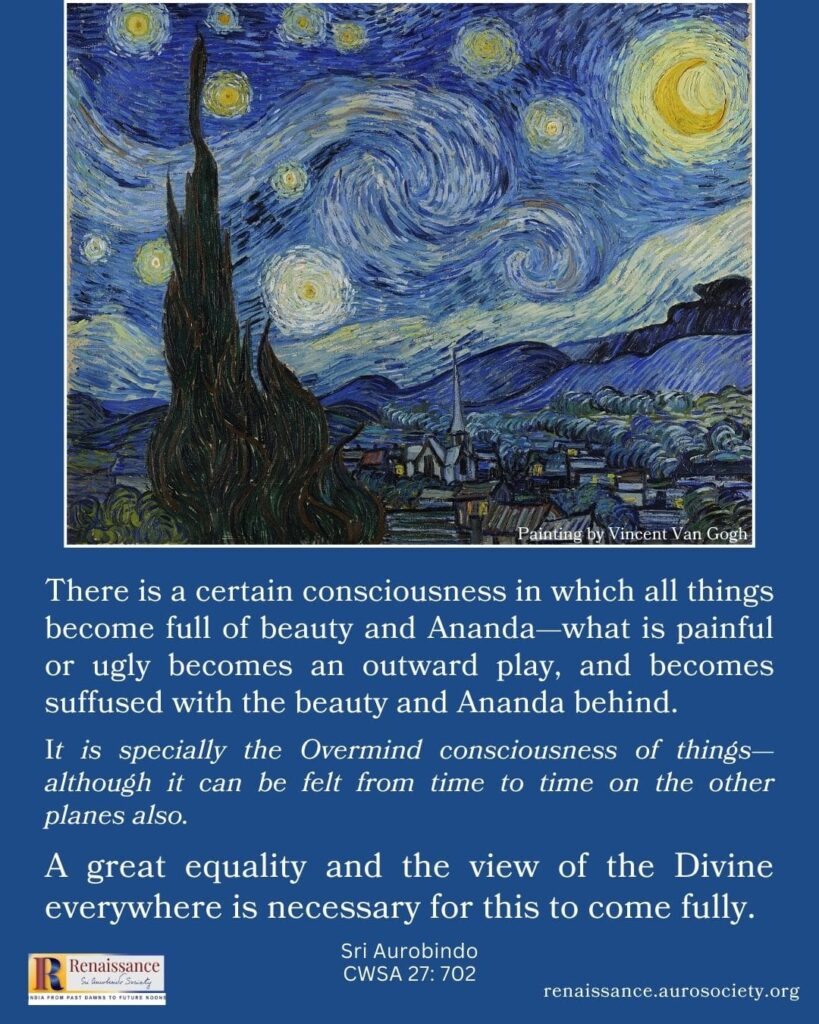
A Historical Look
In the early days of his history man took everything as a phenomenon of life. His science of life began by creating a sharp distinction between life and non-life. But as it is proceeding farther and farther the line of demarcation between the animate and inanimate is growing more and more dim. In the beginning of our apprehension these sharp lines of contrast are helpful to us, but as our comprehension becomes clearer they gradually fade away.
The Upanishads have said that all things are created and sustained by an infinite joy.
To realise this principle of creation we have to start with a division—the division into the beautiful and the non-beautiful. Then the apprehension of beauty has to come to us with a vigorous blow to awaken our consciousness from its primitive lethargy, and it attains its object by the urgency of the contrast.
Therefore, our first acquaintance with beauty is in her dress of motley colours, that affects us with its stripes and feathers, nay, with its disfigurements. But as our acquaintance ripens, the apparent discords are resolved into modulations of rhythm.
At first we detach beauty from its surroundings, we hold it apart from the rest, but at the end we realise its harmony with all. Then the music of beauty has no more need of exciting us with loud noise; it renounces violence, and appeals to our heart with the truth that it is meekness that inherits the earth.
Cult of Beauty and Age of Emancipation
In some stage of our growth, in some period of our history, we try to set up a special cult of beauty, and pare it down to a narrow circle, so as to make it a matter of pride for a chosen few. Then it breeds in its votaries affectations and exaggerations, as it did with the Brahmins in the time of the decadence of Indian civilisation, when the perception of the higher truth fell away and superstitions grew up unchecked.
In the history of aesthetics there also comes an age of emancipation when the recognition of beauty in things great and small becomes easy, and when we see it more in the unassuming harmony of common objects than in things startling in their singularity. So much so, that we have to go through the stages of reaction when in the representation of beauty we try to avoid everything that is obviously pleasing and that has been crowned by the sanction of convention. We are then tempted in defiance to exaggerate the commonness of commonplace things, thereby making them aggressively uncommon.
To restore harmony we create the discords which are a feature of all reactions.
We already see in the present age the sign of this aesthetic reaction, which proves that man has at last come to know that it is only the narrowness of perception which sharply divides the field of his aesthetic consciousness into ugliness and beauty. When he has the power to see things detached from self-interest and from the insistent claims of the lust of the senses, then alone can he have the true vision of the beauty that is everywhere. Then only can he see that what is unpleasant to us is not necessarily unbeautiful, but has its beauty in truth.
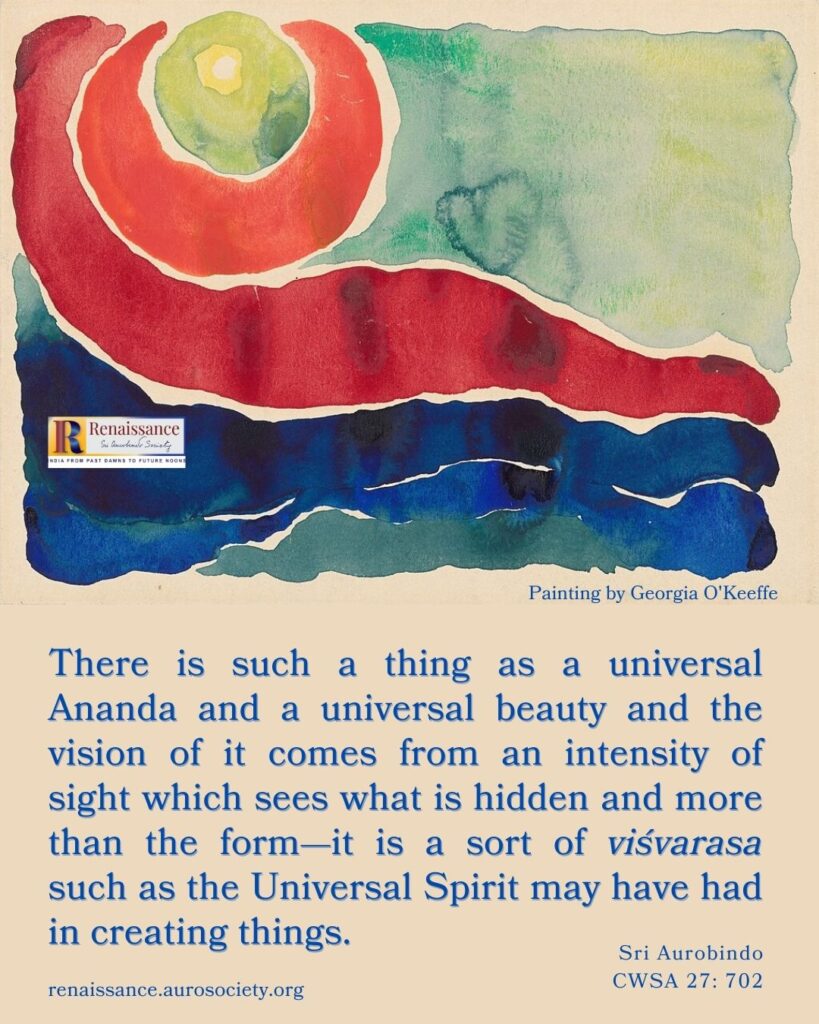
When we say that beauty is everywhere we do not mean that the word ugliness should be abolished from our language, just as it would be absurd to say that there is no such thing as untruth. Untruth there certainly is, not in the system of the universe, but in our power of comprehension, as its negative element. In the same manner there is ugliness in the distorted expression of beauty in our life and in our art which comes from our imperfect realisation of Truth.
To a certain extent we can set our life against the law of truth which is in us and which is in all, and likewise we can give rise to ugliness by going counter to the eternal law of harmony which is everywhere. Through our sense of truth we realise law in creation, and through our sense of beauty we realise harmony in the universe.
When we recognise the law in nature we extend our mastery over physical forces and become powerful; when we recognise the law in our moral nature we attain mastery over self and become free. In like manner the more we comprehend the harmony in the physical world the more our life shares the gladness of creation, and our expression of beauty in art becomes more truly catholic.
As we become conscious of the harmony in our soul, our apprehension of the blissfulness of the spirit of the world becomes universal, and the expression of beauty in our life moves in goodness and love towards the infinite. This is the ultimate object of our existence, that we must ever know that “beauty is truth, truth beauty”; we must realise the whole world in love, for love gives it birth, sustains it, and takes it back to its bosom.
We must have that perfect emancipation of heart which gives us the power to stand at the innermost centre of things and have the taste of that fullness of disinterested joy which belongs to Brahma.

PURNIMA
Poem by Rabindranath Tagore, Translation by Narendra Murty
To fill a lonely evening away from home,
I was reading a book – alone.
A scholarly tome; a critique –
Of what Beauty is.
Learning nuances of the poetic style –
Of Goethe, Shelley and Coleridge.
After many an hour
The strain of reading fevered the mind,
And engulfed my heart with weariness.
Everything felt false, untrue.
Poetic imagination, Beauty, Aesthetics, Rasa –
All seemed nothing but wranglings of the scholars.
For ages, the blind bookworms were weaving
Nothing but a web of words and illusions –
To see their own names
Emblazoned in the stellar sky.
At last, with eyes sleepy with fatigue,
I closed the book. The night was deep.
I rose and blew out the lantern.
Immediately, in that very instant,
From all sides through the windows,
The light of the full moon came flooding in –
Bathing the room, my heart, my eyes –
With a silent luminescent smile
That pervaded the three worlds.
O my Beloved, Hail Thy Beauty!
Thou who slumber in the inner realm of the Infinite,
There’s no end to Thy mystery.
In what sweet irony Thou hast in an instant,
Drowned the arid heart of this sceptic
With the gushing flood of your Beauty.
Unbeknown to me, when you had come
From the starry heavens
With thy gift of beatific silence,
And silently stood at my door
Like a bashful lover, I knew not.
While I was confined in my room
Entangled in the dense web
Of words and arguments;
Wandering alone in the forest of rhetoric;
Walking over the carpet of dry leaves of letters,
I was indeed searching for You all along.
You let your wayward devotee
Wander aimlessly all the while
With your sweet deception.
O my celestial Goddess,
I do not know how you managed
To hide your infinite beauty
Behind that feeble light of a mere lantern.
I do not know how my ears got deafened
By the noise arising out of the vain words
Of the scholars.
I do not know how in their din they drowned –
Your silent speech of benediction.

Read the original Bangla version


